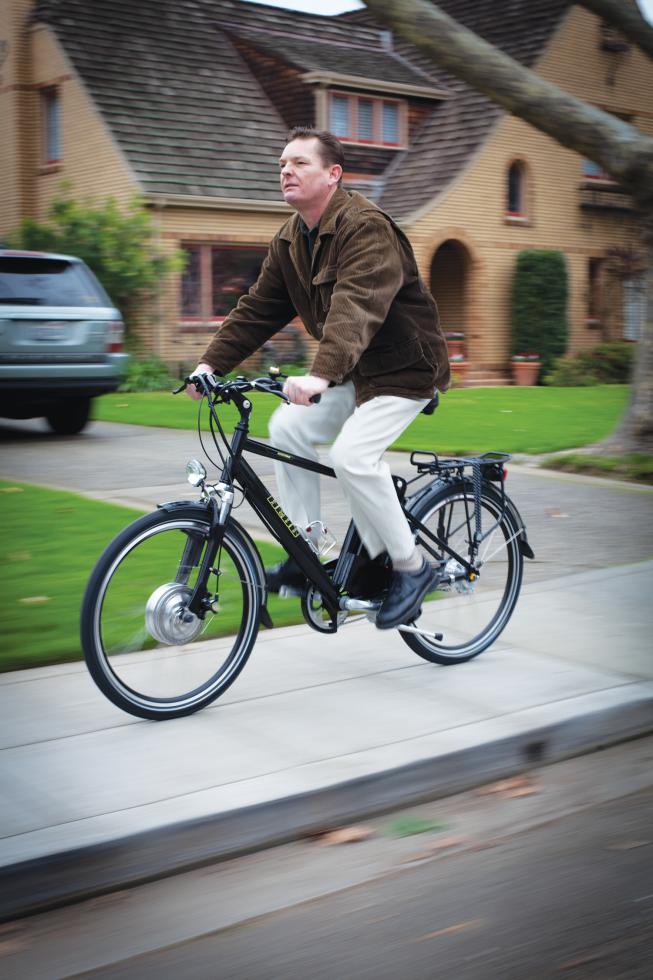An unemployed engineer and an e-waste recycler walk into a bar. The engineer takes the recycler’s electric bike for a spin. And, a year later, The Electric Bike Shop opens its doors in East Sacramento.
It wasn’t the typical get-rich-quick scheme often concocted on barstools across America. One day Ivan Snyder, owner of Computer Recycle Center, had ridden his electric bike to the Hilltop Tavern in East Sacramento. Mike Majors, an unemployed engineer, was one of the many patrons who slid off his barstool to come out and take a look.
“He wasn’t the only person looking at it in awe, but [Majors] is mechanically inclined,” Snyder says. “It almost looks like a Harley.”
Snyder had purchased his bike off Craigslist a few years before and began reselling them out of his East Sacramento home. He gave a bike to Majors and told him to ride around and try to sell them. Majors’ unemployment benefits were about to run out, and he had some investment money that wasn’t earning its potential. He pumped $20,000 into startup costs, and The Electric Bike Shop opened its doors Dec. 11.
Majors signed a one-year lease on an 850-square-foot storefront at J and 34th streets that used to be a check cashing business and, before that, a Baskin-Robbins. Originally, he was looking to land somewhere in the J-K-L corridors of midtown. But somewhere between brokers not returning calls and rents “that were justifiable two to three years ago,” he headed to East Sacramento.
Although the seed for the shop was planted by Snyder, Majors is the sole owner of Electric Bike Shop LLC. For now, Snyder works a couple of shifts as an employee, but he plans to be onsite daily once spring hits. Majors is looking to create a chain of electric bike stores, expanding the business to the Bay Area in three to five years and possibly landing a Northern California exclusive with an unnamed international brand.
Majors is no stranger to bicycles. A civil engineer by trade, he managed his family’s engineering firm in West Sacramento from 1993 to 2003. He spent 60 miles a week commuting on his bike from East Sacramento to West Sacramento. According to the 2009 American Community Survey by the U.S. Census Bureau, there are about 15,000 bike commuters in the six-county region as defined by the Sacramento Area Council of Governments.
And bike commuters are Majors’ target customer. “This is an alternative to a car, not an alternative to a bicycle,” he says.
It’s the same target market that Timothy and Cassidy Castleman are trying to wrangle in Old Sacramento. The father-and-son team opened Practical Cycle in March 2010. They sell and rent electric and traditional bicycles.
“Most people are using [electric bikes] for transportation or to get to work,” Cassidy Castleman says, “people who have all but given up their cars.”
The Castleman’s customers have come from the Sierra foothills, the Bay Area and even Southern California. So far, Practical Cycle has sold 24 electric bikes and four electric tricycles, making up roughly one-third of sales. Electric bikes on the showroom floor range $1,000 to $2,500.
“We’ve got a special one for $4,500 we are trying to get Jerry Brown to buy, but it’s not really for sale otherwise,” Cassidy Castleman says.
The Castlemans opened the bike shop with personal funds, starting with three bikes and no accessories. The shop now carries 16 brands between accessories and bikes.
The business has grown as the Castlemans have pumped sales back into inventory, Cassidy Castleman says, and “Dad got a settlement by getting doored riding his bike downtown,” which went right into the bike shop.
Since opening The Electric Bike Shop in December, Majors has sold 11 scooters, seven bikes and four tricycles. Electric bikes on his showroom floor range $500 to $2,500; electric scooters range $300 to $600. Majors’ profit margin runs 30 to 40 percent. The most expensive bike is the Hebb Electro Glide, which can ride for about 40 miles without pedaling when fully charged. The bikes and scooters on the showroom floor take four to six hours to fully charge.
Electric bikes aren’t new to the region. A few traditional bike shops carry a small selection, such as Mike’s Bikes in downtown Sacramento and B&L Bike Shop in Davis. In 2000, the UC Davis Police Department purchased six police bikes with electric motors with the help of a $12,000 grant from the Yolo-Solano Air Quality Management District. However, Majors says, the reason a trend hasn’t taken off is because the price hasn’t been affordable — until now. Majors currently only carries bikes manufactured in China because they are the most economical for the quality.
China has taken the lead in electric bike sales and manufacturing, speeding up technology and bringing down the costs. In China, electric bike sales grew from 40,000 in 1998 to 10 million in 2005, according to the Electric Bike World Report.
In addition to the cost of the bikes, Cassidy Castleman says another challenge is getting past the perception that bikes are only for exercise.
“It’s hard to make that shift to see a bike as transportation,” he says. “Someone sees the electric motor and asks how you get exercise on the bike.”
The key, Majors says, is getting people to think outside of their cars and onto a more earth-friendly mode of transportation. To complement the company’s green philosophy, Snyder and Majors are working on adding an e-waste drop off at the bike shop. “It would go along with our mission of being environmentally friendly,” Snyder says, “and it would increase foot traffic in the store.”
For more information on Jayson Carpenter:
www.jaysoncarpenter.com
Recommended For You

#YOLO
The 7 best bike rides in Yolo County
Lovely scenery along gently rolling foothills has always made Yolo County an ideal place for cyclists, but who knew everyone took it so seriously?

It’s Impolite to Squat
EV owners find it increasingly difficult to plug in
Long before it was widely accepted, Sacramento attorney Mike Polis bought his first electric vehicle. He got started with a Toyota Prius, later upgraded to a Nissan Leaf and now drives a white Chevy Volt. On average, he saves more than $3,500 a year over his gas-powered counterparts, he can use the HOV lane as a single occupant and he charges his car for free at work.



